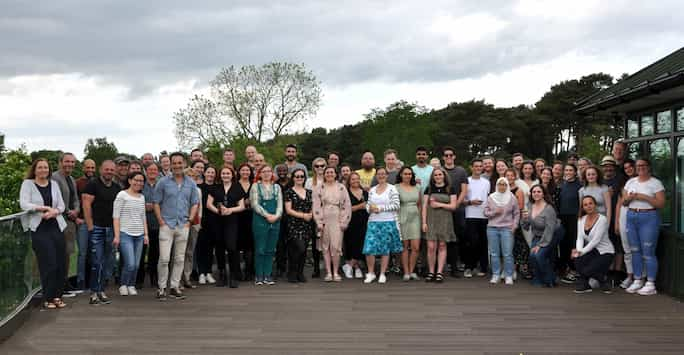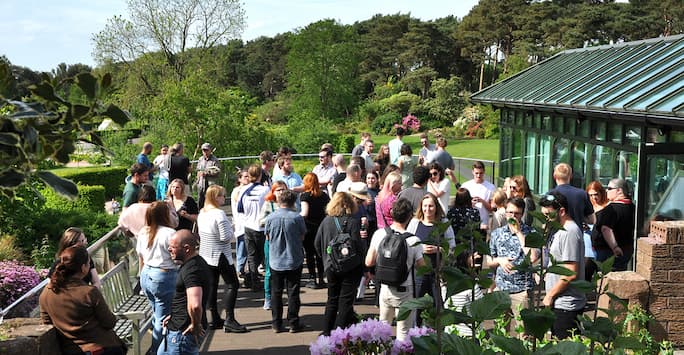The DEEB Colloquium Report
Posted on: 27 May 2022 by Elisha Langley in May 2022 posts

On Wednesday 18th May, the Department of Evolution, Ecology and Behaviour (DEEB) held a Colloquium at Ness Gardens in which 80 people attended. Elisha Langley, member of the Faculty Communications Team, describes her experience of the day.
We were invited to the Department of Evolution, Ecology and Behaviour (DEEB) Colloquium that was held on Wednesday the 18th of May held at Ness Gardens. The event itself was attended by 80 people, ranging from seasoned academics to PhD students for a day of science interaction with topics ranging from microbe-induced aphid resistance in plants, to making predictions about biological invasions on a global scale. In total, there were seven talks, and each was followed by a Q&A session, in which many participated.
The day began when we arrived at Ness Gardens, funnelling into the Hulme Conservatory where all the talks would be taking place. The morning session included two talks chaired by Dr Ewa Chrostek, the first being ‘Microbe-induced resistance in plants against aphids’ by Dr Sharon Zytynska, it was interesting to see that crops can be affected by something on a microscopic scale but have a large impact on crop yield. The second talk was by Professor Paula Stockley discussing ‘Competition, cooperation and kinship in a social mammal’, which is probably the most in depth talk I’ve ever been to that discusses the scientific importance of these relationships and mice (which was also spoken about later on in the day).
After a quick tea and coffee break, we moved to a session chaired by Dr Raj Whitlock, who introduced the guest speaker, Professor Helen Roy, from the NERC Centre for Ecology & Hydrology, with her talk ‘Making predictions about biological invasions to inform prevention globally’. It was interesting to see the impact of invasive species all over the world, and especially that of the harlequin ladybird that was making its way across the UK, compared with other species.
Following the lunch break Professors Andrea Betancourt and Greg Hurst gave everyone the chance to get into groups to become ‘scientifically creative’, asking them to imagine what new technology they would invent, and then what EEB science they would do with this – a time machine was ruled off limits, because obviously one would want to go and see living dinosaurs. It was wonderful to see the different ideas that each group came up with, the highlights being ‘The De-Evolution Microwave Machine’ , where one could dial back through the evolutionary history of a species, to study its ecology, but also collect its DNA, and a ‘Swiss Army Drone’ which could multi-task to remotely study animal movements in real time, changes in species ranges to study invasions, but also be ground penetrating to find fossils..hen we spoke to Professor Mark Viney, the head of DEEB, about the session, he said he “was quite astounded by the scientific creativity that people had when given free rein”.
The rest of the afternoon, chaired by Dr Louise Cheynel, was for three PhD students to showcase their work. First all was Helen Davison and her talk ‘Hidden in plain sight: finding symbionts in genome databases’, followed by Alice Clark on the ‘Social influences on sexual maturation in female house mice’ and to finish the afternoon session was Kelly Ross talking about ‘The effects of body mass and oxygen environment on mammalian blood oxygen affinity’.
After all the talks and Q&As, it was time for more informal discussions over refreshments, enjoying the scenery and great weather we had all day, quite the perfect ending to a wonderful colloquium.

Professor Mark Viney had this to say about the successful event, “After 2 years of a pandemic it was great to have everyone together again where we could share and enjoy our science, which helps us all do the very best science that we can”. Thank you for everyone who turned up to make it a wonderful day of discussing research and experiencing Ness Gardens in all its beauty and thank you to everyone who organised the colloquium, we look forward to the next one!
Keywords: DEEB Colloquium 2022, Ness Gardens, PhD, researchers.